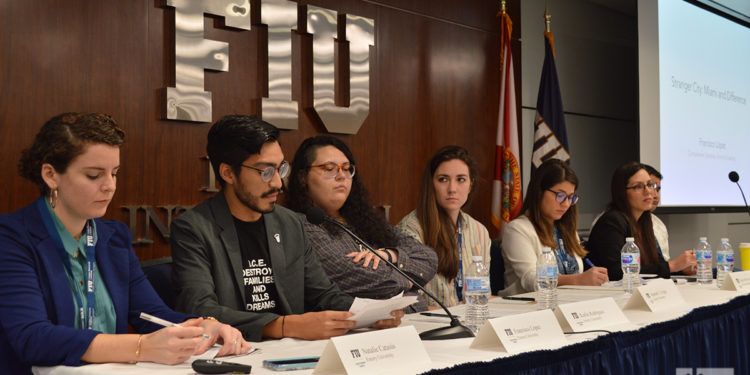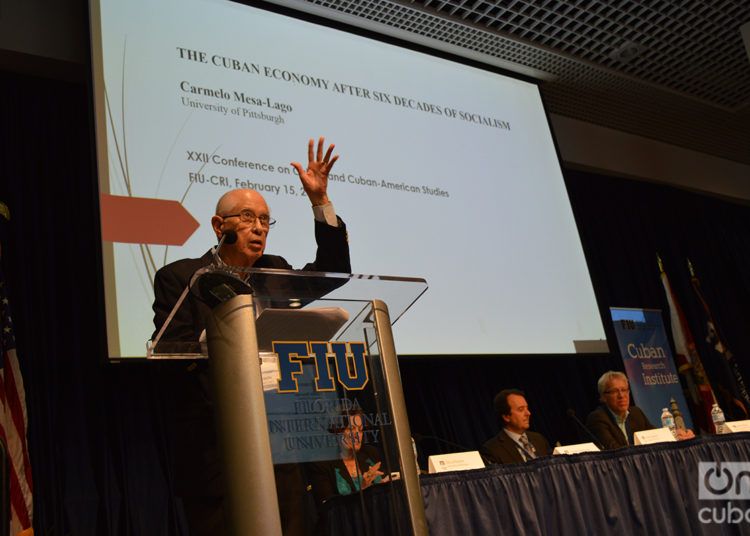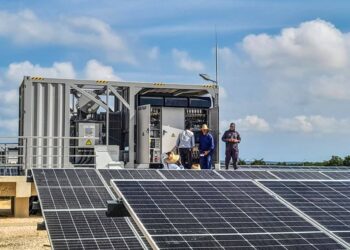Before an audience of specialists, students and analysts during the second day of sessions of the 12th Conference on Cuban and Cuban-American Studies of the Florida International University, economist Carmelo Mesa-Lago emphasized that the Cuban economy is at its worst moment since the 1990s.
A setback in Venezuela would be a kind of sentence for the current Cuban economy. “If Maduro fails, the crisis in Cuba will worsen significantly,” he said in Miami this Friday. One solution would be to search for a new “subsidizer.”
The reforms that President Raúl Castro tried to introduce in the country “have been very slow and are subject to many restrictions, taxes discourage investments and that prevents the advance of the private sector, conspiring against the need for economic growth,” he said.
During the questions session with the audience, Mesa-Lago explained that the Cuban leadership has not made much progress in the economic reforms because “in my opinion it’s obvious there’s a sector that opposes them.”
“Another country can assume the subsidies of the Cuban economy. It may be Russia or China, but Russia is the seventh trade partner and the agreements they have signed are under study. The oil that Russia exports [to Cuba] is actually paid for by PDVSA [the Venezuelan state oil company]. Not much headway has been made in that. And with China it is true that it is the second trade partner but the exchange is very low, not very meaningful,” the researcher said.
When Raúl Castro took power in 2006, the gross domestic product grew 12.3%. But it has gradually declined until in 2018 it has fallen to 1.2%.
The figures are complicated, according to Mesa-Lago, with the fact that the fiscal deficit jumped from 3.2% in 2007 to 8.7% ten years later.
The creation of capital practically didn’t change in 10 years, it had some fluctuations, but in 2007 it was 10.2% of the gross domestic product and in 2017 it was only 10.3%.
“The industrial production index in 2017 was 32% lower than in 1989, when the Soviet Union started disappearing.”
“The decline in oil remittances [from Venezuela], which sustains the country, still play a significant role no matter how much they have gone down. The political crisis has increased and that will profoundly affect the Cuban economy if ties are cut,” he added.
But the economist recognizes that there are certain economic reserves, most of which are the result of the reconversion that the island suffered in the last decades when it became a country that provides services, such as the sending of doctors abroad and tourism.
While in 1958 sugar accounted for 75% of exports and 22% of the gross domestic product, in 2018 all this has been replaced by tourism and professional services, which now represent 80% of exports and 12% of the domestic product.
Even so, in absolute values, the export of services contributes some 8.061 billion dollars annually and tourism 3.318 billion. “Those are net incomes,” he specifies, because in global figures the balance of payments deficit is complicated. Cuba exports 2.704 billion dollars in merchandise but imports 10.212 (2017), the majority to support the tourist industry. The revenue from this sector grew 53 times between 1958 and 2018.
The wretched circumstance…

Panel on Cuba and Puerto Rico at the 12th Conference on Cuban and Cuban-American Studies. Photo: Marita Pérez Díaz.
In a context where climate change is a reality with an economic and social impact on islands such as Cuba and Puerto Rico, the academy is studying the most recent practices of preparation and recovery from natural disasters.
A comparative paper between the recovery processes in both countries highlighted that the main difference is that Cuba is a sovereign country, while Puerto Rico “is a colony that does not interest the United States,” explained one of its authors, Katsyris Rivera-Kientz, from the University of Massachusetts in Boston.
“This directly affects the actions taken by the government in the recovery efforts, as occurred after the passage of Hurricane Maria,” said Rivera-Kientz, who argued that the response plan in Puerto Rico was intended only for category one hurricanes, and “the aid from federal agencies like FEMA was insufficient.”
Despite the fact that the civil defense system in Cuba effectively prevents the loss of life, Rivera-Kientz referred to the fine line between official intervention and the individual freedom of persons who decide not to evacuate.
“Puerto Rico is an aging island, and many people stubbornly decide not to evacuate, which is a practice that is respected both on the island and in the United States,” he said.
On the other hand, the co-author of the research, Denisse Delgado-Vázquez, said that in the case of Cuba “it would be advisable to evaluate a decentralization of those structures that give greater power to local governments, as intermediaries between those affected and humanitarian aid.”
The panelists highlighted the use of social networks to mobilize aid from the diaspora in both countries.
In the specific case of Cuba, the recent use of 3G technology and greater access to social networks such as Facebook and WhatsApp generated spontaneous responses and effective private initiatives both inside and outside the island after the destructive tornado that hit Havana.
“Internet on mobile phones offered several things after the disaster: access to information in real time, alternative ways of organizing aid and greater freedom of action through private initiatives,” summarized Delgado-Vázquez.
The cultural work and the artists of both countries are leading numerous initiatives that could be imitated and studied more thoroughly for future processes of recovery from natural disasters, the panelists concluded.










